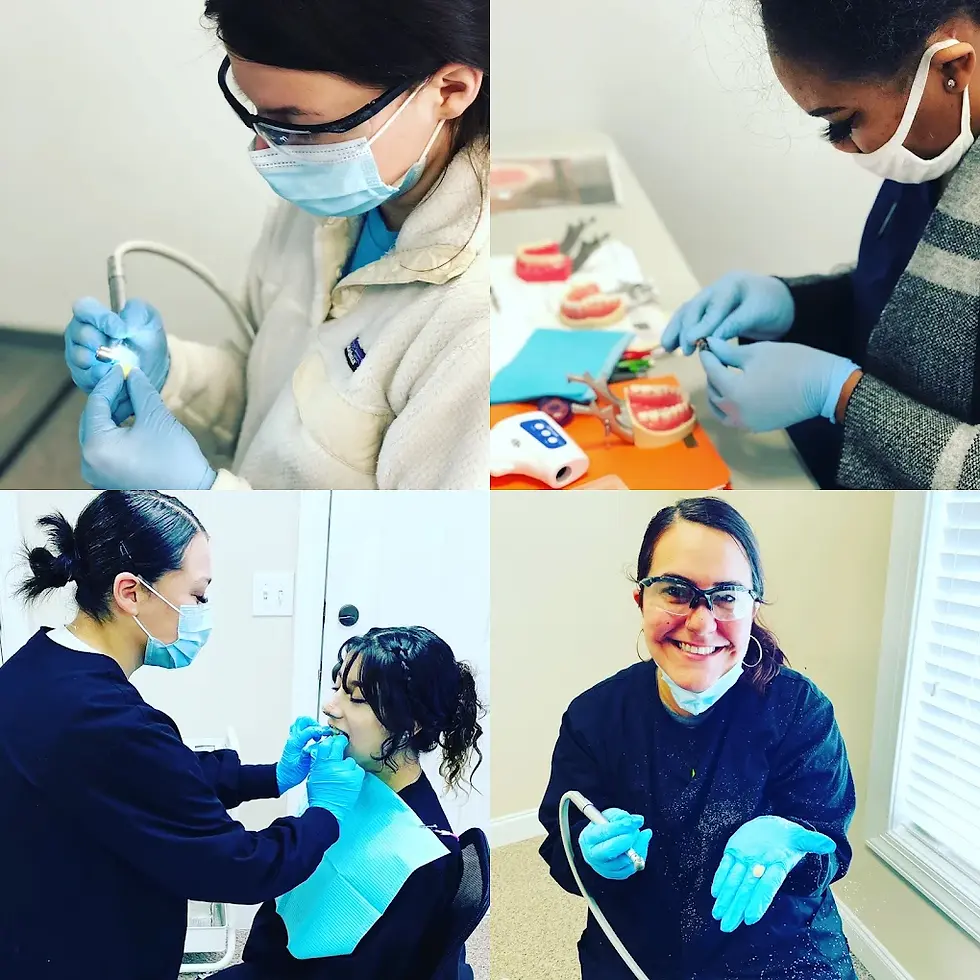The TSDA Advantage: A Look at Training Facilities vs. Franchise Setups
- triangledentalassi
- Aug 1, 2025
- 3 min read
Updated: Sep 23, 2025

When you’re choosing a dental assistant school in Raleigh, NC, the options can feel overwhelming. But one factor makes a bigger difference than most people realize: where your training happens.
At Triangle School of Dental Assisting (TSDA), students train in a dedicated dental assisting classroom and clinical facility — built from the ground up for NC dental assistant training. This space isn’t borrowed, rented, or shared with a working dental office. It’s our school’s home base, designed to maximize learning.
Many franchise dental assistant programs take a different approach — operating out of rented space inside an existing dental practice. While that can look convenient on the surface, it often means compromises in access, consistency, and focus.
Below, we’ll break down exactly why TSDA’s local, long-term investment in a dedicated training facility gives our students an edge.
Why Facilities Matter in Dental Assisting Education
Dental assisting is a hands-on career, and your training should be, too. A true professional program should simulate the flow and tools of a dental office — without being at the mercy of one.
At TSDA, our training environment is:
Built for instruction — with dedicated chairs, X-ray stations, sterilization areas, and lab space available at all times.
Designed for flexibility — students never have to “fit in” around a dental practice’s patient schedule.
Fully equipped for learning — from digital radiography units to mannequins and whiteboards, our tools support both theory and practice.
This means your education isn’t limited by the logistics of a shared office. You get the time, space, and access needed to master real-world dental assisting skills.
The Franchise Model: Built for Scale, Not Specialization
Franchise dental assisting programs often grow quickly by renting space in existing dental practices. While this keeps startup costs low for the franchise, it often creates challenges for students:
Limited equipment access — students may have to work around the office’s schedule and staff availability.
Weekend-only formats — many franchise programs meet just on Saturdays, stretching out the program or slowing the pace.
Inconsistent facilities — your training quality can vary depending on the particular office layout and resources.
Hands-on learning still happens — but without a purpose-built classroom, students often experience unpredictability and reduced depth of training.
TSDA: A Stable, Local Option with a Real-World Feel
TSDA is not a franchise. We are a locally owned dental assisting school in Raleigh with a long-term commitment to doing things right. Our facility reflects that commitment:
Same space every week — no rotating sites or switching offices.
Consistent instructors — build rapport and trust with the same experienced educators.
Full access to tools — learn and practice without waiting for availability.
And because we own and operate our facility, our NC dental assistant training program is:
More immersive — deeper learning without distractions.
More efficient — complete the program in just 15 weeks.
More tailored — personalized instruction and support from start to finish.

How to Compare Dental Assisting Programs
When evaluating your options, ask each school:
Where does training take place?
Is the space fully dedicated to instruction?
Will I have regular, direct access to the equipment?
Will I work with the same instructors every week?
These questions help reveal whether a program is built for student success or simply for convenience.
Ready to See the Difference?
If you’re exploring local dental assistant programs in the Raleigh area, we’d love to show you the TSDA facility in person.
Visit our Program Overview or Contact Page to learn more and schedule a visit.
Your education deserves a space designed for learning — not one borrowed from another business.
FAQs
Q1: What’s the difference between a franchise dental assistant school and an independent one like TSDA?
A: Franchise schools rent space in a dental office and operate under a corporate brand. TSDA is an independent, locally owned dental assisting school in Raleigh, operating in a dedicated training facility designed for hands-on learning.
Q2: Does training in a dental office mean more hands-on experience?
A: Not necessarily. In franchise programs, the dental office is often shared or used part-time. TSDA students enjoy uninterrupted, full-time access to equipment and operatory setups.
Q3: How does TSDA’s facility improve learning compared to a franchise setup?
A: Our purpose-built classrooms and operatories give students consistent access to the exact tools they’ll use on the job — without competing with a dental office’s business hours.
Q4: Are franchise schools more affordable?
A: Some advertise lower tuition, but often add hidden fees for certifications, uniforms, or materials. TSDA offers transparent pricing and all-inclusive tuition with no surprise costs — plus personalized job support.
Q5: Why does TSDA choose not to operate from a dental office?
A: We believe the best learning happens in a dedicated educational environment. A standalone facility minimizes distractions, ensures safety, and maximizes skill development.
